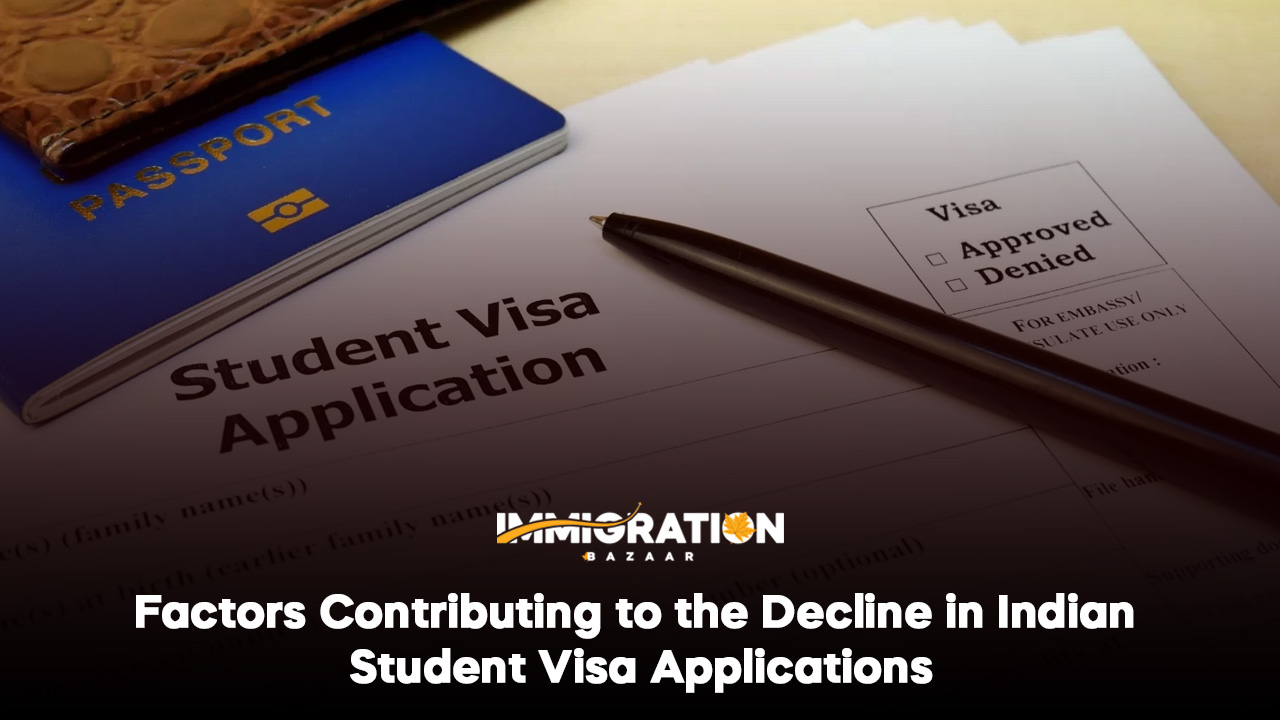The United Kingdom has seen a notable 23% decline in student visa applications from Indian students, a shift that raises concerns and highlights evolving trends in global education. Multiple factors contribute to this decline, ranging from increased visa processing times to stricter immigration policies and broader economic uncertainties. Understanding these dynamics is essential for students, institutions, and policymakers alike, as it sheds light on the competitive landscape of international education.
Factors Contributing to the Decline in Indian Student Visa Applications
-
Stricter Immigration Policies
The UK government has recently implemented more stringent immigration policies aimed at controlling the number of international students. These policies have made it more challenging for Indian students, who represent a significant portion of the UK’s international student population, to secure visas. Among the changes are more rigorous documentation requirements and financial checks, which can delay or complicate the visa process.
For many students, particularly those from lower-income families, these additional hurdles are significant. The policies, which are perceived as discouraging, have prompted students to reconsider the UK as a viable study destination. Unlike a few years ago, when Indian students could rely on relatively streamlined visa approvals, the process has become more complex and unpredictable, leading to a decline in applications.
-
Increased Visa Processing Times
Alongside the stricter policies, the time taken to process student visa applications has lengthened. This increase in processing time is partially due to the UK’s efforts to tighten immigration controls and reduce the perceived misuse of student visas. However, long delays are a deterrent for prospective students who are eager to secure their place at universities before term start dates.
Indian students, who often plan their academic journeys well in advance, are increasingly frustrated by the uncertainties in the visa approval process. A delayed visa can mean missing enrollment deadlines or even losing a year of study, which further discourages them from applying to UK institutions.
-
Rising Living Costs in the UK
The cost of living in the UK, especially in major cities like London, has risen significantly in recent years. For international students, living expenses, including accommodation, food, and transportation, add up quickly, putting a strain on their finances. The UK has long been one of the more expensive countries for international students, and with inflation and rising costs, it has become even more difficult for Indian families to afford an education there.
Indian students, many of whom rely on family savings or education loans to fund their studies, are finding it harder to justify the cost of living in the UK. This is particularly true when there are alternative countries offering lower living costs and more favorable economic conditions.
-
Economic Uncertainty and Value of Foreign Degrees
Another factor contributing to the decline in visa applications is growing economic uncertainty, both in the UK and globally. The COVID-19 pandemic, followed by inflationary pressures and economic slowdowns, has raised concerns about the long-term value of foreign degrees, particularly in expensive countries like the UK.
Indian students are increasingly questioning whether the high cost of studying abroad will yield the desired return on investment. With job markets tightening and post-study work opportunities becoming more competitive, students are considering whether their degrees will help them secure well-paying jobs, both abroad and back in India. The UK’s shifting policies on post-study work visas have also contributed to this uncertainty. While the UK has introduced the Graduate Route to allow students to stay for up to two years after graduation, the rules around this are complex, and many students are unsure about their future prospects.
-
Brexit and Political Factors
Brexit has also played a role in shaping perceptions of the UK as a study destination. While the full effects of Brexit on immigration policies are still unfolding, the uncertainty surrounding the UK’s relationship with the rest of Europe has made some international students wary of choosing the UK for their studies.
Previously, studying in the UK offered a gateway to opportunities in Europe, as students could easily move between EU countries. However, with Brexit, the UK’s separation from the European Union has complicated this mobility. Indian students, who are looking for flexibility and opportunities across multiple countries, may now opt for countries that offer more regional integration, such as Germany or France.
Alternative Study Destinations for Indian Students
With the UK becoming less attractive to Indian students, many are turning to alternative study destinations that offer more favorable conditions. Countries like Canada, Australia, Germany, and Ireland have become popular due to their more welcoming visa policies, lower living costs, and robust post-study work options.
-
Canada
Canada has emerged as one of the top choices for Indian students in recent years. Its immigration policies are more flexible, and the Post-Graduation Work Permit Program (PGWP) allows students to work in Canada for up to three years after completing their studies. Additionally, Canada’s relatively low cost of living, compared to the UK, makes it an appealing option.
Canadian universities are known for offering quality education at a lower cost, and the country’s multicultural environment is particularly welcoming to Indian students. The Canadian government has also been actively recruiting international students, seeing them as potential future residents who can contribute to the economy.
-
Germany
Germany is another attractive destination for Indian students, particularly those interested in engineering, technology, and sciences. Many German universities offer courses in English, and the country is known for its tuition-free or low-cost education system. While the cost of living in Germany is higher than in some other countries, it is still more affordable than the UK, especially in cities outside of major hubs like Berlin or Munich.
Germany also offers strong post-study work opportunities, with many Indian students finding employment in the country’s thriving tech and manufacturing sectors. The visa process for students is generally seen as straightforward, and the opportunity to learn a new language adds to the appeal.
-
Australia
Australia is another popular destination for Indian students, particularly in fields such as business, IT, and healthcare. Australian universities are known for their strong research programs and offer a range of scholarships to international students. Like Canada, Australia has a post-study work visa system that allows graduates to remain in the country and work, making it easier for students to gain valuable international experience.
Australia’s relatively lower cost of living (compared to the UK) and welcoming immigration policies are major draws for Indian students. In addition, the country’s proximity to Asia makes it a convenient location for students who wish to stay connected to their home region.
-
Ireland
Ireland is becoming increasingly popular as a study destination for Indian students, particularly in fields like IT, business, and healthcare. Irish universities offer a range of scholarships, and the country’s strong ties to the European Union offer students opportunities to work across Europe. Ireland’s post-study work visa policies are also favorable, allowing students to stay and work for up to two years after graduation.
With English as the primary language of instruction, Ireland is an attractive alternative to the UK for Indian students looking for quality education without the uncertainties of the UK’s post-Brexit environment.
The Broader Impact of the Decline in Applications
The 23% decline in Indian student visa applications is significant not only for the students themselves but also for the UK’s higher education sector. Indian students make up a large portion of the international student population in the UK, and this decline could result in substantial revenue losses for universities. International students typically pay higher tuition fees than domestic students, and universities rely heavily on this income to fund programs and facilities.
Moreover, the decline could affect the diversity and global standing of UK universities. Indian students contribute to the cultural and intellectual diversity of university campuses, and their absence could make the UK less attractive to other international students as well.
UK universities are already responding to these challenges by offering more scholarships and financial aid to attract students. However, unless the government addresses the broader issues of visa delays, living costs, and post-study work opportunities, the decline in Indian student applications is likely to continue.
Conclusion
The 23% decline in student visa applications from Indian students highlights the growing challenges the UK faces in remaining competitive in the international education market. Stricter immigration policies, increased visa processing times, rising living costs, and concerns over the value of foreign degrees have all contributed to this trend. As Indian students explore other destinations that offer more favorable conditions, countries like Canada, Germany, Australia, and Ireland stand to benefit.
For the UK, this decline is a wake-up call to reassess its immigration policies and ensure that it remains an attractive destination for international students. Without changes, the UK risks losing its position as a top choice for Indian students, with significant implications for its higher education sector and broader economy. The competitive landscape of global education is shifting, and the UK must adapt to remain a leader in this space.







